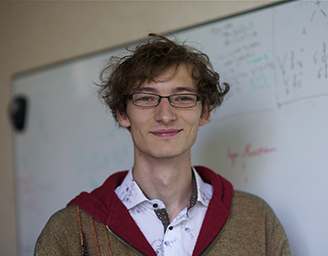 Dr. Victor Magron
Dr. Victor Magron
Laboratoire d’analyse et d’architecture des systèmes (LAAS-CNRS)
Institute of Mathematics from Toulouse
Équipe POP
e-mail: vmagron@laas.fr
webpage: https://homepages.laas.fr/vmagron
Title of the invited lecture: Sparse polynomial optimization: theory and practice
Author: Victor Magron
Polynomial optimization methods often encompass many major scalability issues on the practical side. Fortunately, for many real-world problems, we can look at them in the eyes and exploit the inherent data structure arising from the input cost and constraints. The first part of my talk will focus on the notion of “correlative sparsity”, occurring when there are few correlations between the variables of the input problem. The second part will present a complementary framework, where we show how to exploit a distinct notion of sparsity, called “term sparsity”, occurring when there are a small number of terms involved in the input problem by comparison with the fully dense case. At last but not least, I will present a very recently developed type of sparsity that we call “ideal-sparsity”, which exploits the presence of equality constraints. Several illustrations will be provided on important applications arising from various fields, including computer arithmetic, robustness of deep networks, quantum entanglement, optimal power-flow, and matrix factorization ranks.
Short CV:
Victor Magron is a junior researcher at the Laboratoire d’analyse et d’architecture des systèmes (LAAS-CNRS), in the department of Decision and Optimization, in Toulouse, France. He did a PhD about formal proofs for global optimization at Ecole Polytechnique, France, funded by INRIA, under the supervision of Benjamin Werner and Stéphane Gaubert. One of the main purposes was to certify nonlinear inequalities used in the proof of the Kepler Conjecture by Thomas Hales (Flyspeck Project), completed in 2014. From 2008 and 2010, he trained as a Master student in computer science, funded by the Monbukagakusho, under the supervision of Shinobu Yoshimura in the Systems Innovation Department of the University of Tokyo. In 2014, he was a Postdoc in the Methods and Algorithms for Control (MAC) team from LAAS-CNRS under the supervision of Didier Henrion and Jean-Bernard Lasserre, funded by the Simone and Cino del Duca foundation of the Institut de France. In 2014-2015, he was a Research Associate in the Circuits and Systems group at Imperial College, in collaboration with George A. Constantinides and Alastair Donaldson. From 2015 to 2018, he was a CNRS junior researcher affiliated to VERIMAG in Grenoble. In 2019, he was affiliated to LAAS-CNRS, in the MAC team, located in Toulouse. He has been also associated researcher to the Institute of Mathematics from Toulouse since 2020. Since 2022 he has taken the lead of a new team in LAAS focusing on polynomial and moment optimization, called POP.
His research is devoted to applications of certified optimization (e.g. semidefinite optimization), especially polynomial optimization to quantum and control systems, deep learning, energy networks. He is interested in modeling such problems as real (non)-commutative polynomial optimization problems and efficiently solving them with structure-exploiting moment-sums of squares hierarchies of conic relaxations. He has given several invited lectures and co-authored more than 60 peer-reviewed publications in polynomial optimization. He has benefited from 15 research stay invitations in Slovenia, Sweden, Germany, France, Japan, including two long research stays in the INRIA PolSys group of Jean-Charles Faugère from LIP6 France and the control group of Anders Rantzer from LTH Sweden. In 2023 he published a book, entitled Sparse polynomial optimization: theory and practice, in the Series on Optimization and Its Applications, World Scientific Press. He has been the main PI of 11 research grants, including a starting Tremplin-ERC fellowship funded by ANR, industrial contracts funded by France’s Transmission System Operator. He has been a member of the Marie Sklodowska-Curie Innovative Training Network POEMA, a co-PI of the hybrid AI DesCartes project between France and Singapore funded by CREATE, and a junior PI of the polynomial optimization chair of the Artificial and Natural Intelligence Toulouse Institute.